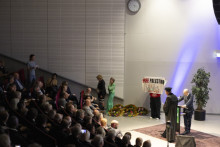The University of Twente has now adopted a broad precautionary principle, according to a proposal from the Executive Board that was discussed last week in a joint meeting with the University Council. This means the UT will no longer initiate or extend research collaborations with countries where the government is engaged in the use of excessive violence, human rights violations, war crimes, or genocide. Currently, this specifically concerns Afghanistan, the Democratic Republic of Congo (DRC), Ethiopia, Israel and the occupied territories, Myanmar, Syria, Sudan and Yemen.
Exceptions and caveats
There is one important exception: the restriction does not apply if the research actively contributes to the protection of human rights, helps prevent violence, alleviates human suffering, or supports peacebuilding and diplomacy. According to the proposal, any such exceptions must first undergo thorough ethical review.
Another factor is that the UT cannot simply withdraw from ongoing projects. According to the Executive Board, legal steps to terminate partnerships can only be taken if funders adjust their policies accordingly and if other consortium partners also agree. The Board emphasised that it does wish to express its concerns in certain cases — for example regarding Israel and Gaza — but also acknowledged that it can never fully predict how research outcomes will eventually be used.
Door slightly ajar
Because individual researchers or institutions in such countries may not support the actions of their governments — and because their research may be entirely unrelated to the conflict — the UT leaves the door ‘slightly ajar’ for potential collaboration, under the principle of academic freedom. As Executive Board President Vinod Subramaniam put it: ‘That principle works both ways — we also don’t want to force our people to be involved in things they don’t support.’
Red Cross as reference
As a starting point for determining which regions are affected, the UT is using the list issued by the International Committee of the Red Cross (ICRC). According to the University Council, this approach has advantages: it helps prevent decisions from descending into endless debates based on personal opinions. On the other hand, it also presents challenges — for instance, Ukraine appears on the list, despite the UT maintaining collaborations there. Council member Catalin Popa suggested using reports from Amnesty International and Human Rights Watch as alternatives. Subramaniam responded: ‘The Red Cross is a highly respected organisation — we have to start somewhere and approach this pragmatically. But we’re open to suggestions.’
Interdisciplinary review committee
The University Council proposed that potential collaborations be assessed by an interdisciplinary committee to safeguard transparency and accountability. Council members also argued that the names of committee members should be made public to ensure maximum openness. They further called for exploring whether more input from students and staff could be incorporated. Subramaniam noted that the university must handle the process ‘as openly as possible, and as confidentially as necessary’ — to protect individuals while still ensuring full transparency in the decision-making process.
Such a committee is in the works, though it may take some time, said Erwin Medendorp, UT’s Integrated Safety Manager. ‘It needs to be an ethical-moral committee. A working group is currently developing the core principles and the types of questions it will address.’
Israel and Gaza
The University Council also urged the Executive Board to terminate all collaborations with Israel as soon as possible. The Board responded that a decision on this matter would follow ‘very soon.’ According to Medendorp, the UT has raised concerns with the Dutch government about Israeli breaches of the association agreement, but noted that it cannot unilaterally end existing partnerships.
The University Council advised positively on the Executive Board’s proposal.





